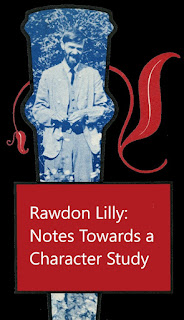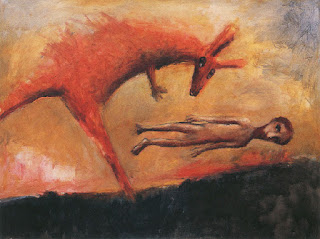Graphite pencil on canvas with ochre primer
(80.2 x 103.3 cm)
I.
As readers of D. H. Lawrence are very well aware, he loves to write about the mysterious nether region of the human body known as the loins - i.e., that zone of libidinal intensity that lies somewhere between the ribs and the pelvis (or above the legs, but below the waist).
In fact, the only thing that excites his imagination more are the bowels ...
II.
Unfortunately, a bit like Frank O'Hara, I'm not quite sure I always understand what Lawrence is getting at when he uses this term [1]. On the one hand, it seems to be more than simply an anatomical reference to the gastrointestinal tract; indeed, for Lawrence, the bowels seem to be the seat of human compassion from which the deepest desires also spring.
But, on the other hand, Lawrence likes to base his philosophical understanding of the body in biology where possible. So when he talks about the bowels, he is also referring us to the digestive system and those sausage-like organs known as the intestines or entrails.
And, rather like Kenneth Williams, who described his daily bowel movements obsessively in his diaries, Lawrence seems to be plagued by a fear of things not working properly in this region, as we can see in the novel Kangaroo (1923), for example, when the marsupial-like fascist Ben Cooley is shot several times in his "'bloomin' Kangaroo guts'" [2], as one of his followers says.
Richard Somers - the book's Lawrentian avatar - visits Cooley in the hospital and can barely disguise his horror and disgust at the thought of ruptured bowels:
"Somers found Kangaroo in bed, very yellow, and thin [...] with haunted, frightened eyes. The room had many flowers, and was perfumed with eau de cologne, but through the perfume came an unpleasant, discernible stench. [...]
Somers could not detach his mind from the slight, yet pervading sickening smell.
"'My sewers leak,' said Kangaroo bitterly, as if divining the other's thought." [3]
Bruce Steele's explanatory note on this is spot-on:
"Jack's angry reaction to his leader's having been shot in the stomach and not killed outright probably reflects the First World War soldier's fear of abdominal wounds. In a pre-biotic age, peritonitis was a common and deadly complication of such wounds. While a ruptured bowel could be stitched, contamination of the abdominal cavity was frequently fatal; it would account for the 'unpleasant, discernible stench' and Kangaroo's diagnosis 'My sewers leak'. If the sniper had deliberately aimed at his stomach rather than his head - which would probably have killed him instantly - it would have been in the knowledge that the victim would almost certainly die a slow and painful death." [4]
Of course, whilst being shot in the stomach can lead to a slow and painful death for a man, being disemboweled by the horns of an angry bull can be an equally horrific (and, arguably, even more obscene) way for an elderly horse to die.
And so to Mexico City ...
III.
There are several disturbing scenes in Lawrence's novel The Plumed Serpent (1926), including the opening one set at the plaza de toros [5] - and I'm not referring to the fact that someone in the crowd thought it funny to throw an orange at the bald spot on Owen's sunburnt head.
Rather, I'm referring to the following incident involving a blindfolded horse ...
"The picador pulled his feeble horse round slowly, to face the bull, and slowly he leaned forward and shoved his lance-point into the bull's shoulder. The bull, as if the horse were a great wasp that had stung him deep, suddenly lowered his head in a jerk of surprise and lifted his horns straight up into the horse's abdomen. And without more ado, over went horse and rider, like a tottering monument upset.
The rider scrambled from under the horse and went running away with his lance. The old horse, in complete dazed amusement, struggled to rise, as if overcome with dumb incomprehension. And the bull, with a red place on his shoulder welling a trickle of dark blood, stood looking round in equally hopeless amazement.
But the wound was hurting. He saw the queer sight of the horse half reared from the ground, trying to get to its feet. And he smelled blood and bowels.
So, rather vaguely, as if not quite knowing what he ought to do, the bull once more lowered his head and pushed his sharp, florishing horns in the horse's belly, working them up and down inside there with a vague sort of satisfaction." [6]
As the novel's protagonist Kate Leslie rightly recognises, this shocking spectacle reveals nothing so much as human cowardice and indecency. She turns her face away in disgust. And when she looks again, "it was to see the horse feebly and dazedly walking out of the ring, with a great ball of its own entrails hanging out of its abdomen and swinging reddish against its own legs as it automatically moved". [7]
But the sordid show isn't over: another horse is brought into the bullring so that it may be publicly disemboweled for the amusement of the crowd:
"Kate knew what was coming. Before she could look away, the bull had charged on the limping horse from behind [...] the horse was up-ended absurdly, one of the bull's horns between his hind legs and deep in his inside. Down went the horse, collapsing in front, but his rear was still heaved up, with the bull's horn working vigorously up and down inside him, while he lay on his neck all twisted. And a huge heap of bowels coming out. And a nauseous stench." [8]
IV.
I've never been (and wouldn't go) to a bullfight, and so would find it difficult (and disturbing) to visually imagine this scene were it not for the fact that Picasso - a lifelong bullfighting enthusiast - produced the image at the top of this post, after attending a bullfight in Barcelona during his stay in the city in 1917.
As the anonymous author of a piece describing this work on the Picasso Museum's website rightly notes:
"In contrast to what he had mostly done on previous occasions, here the artist leaves aside the colourful and festive representation of the spectacle of bullfighting to focus his attention [...] on the solitary agony of the disemboweled horse, which collapses until it falls on its knees in a fetal position or prayer posture that has been compared to that of a fossilised crustacean or bird. Picasso manages to transcribe the animal's stabbing pain by means of its outstretched neck and raised head, looking upwards with a fixed gaze, as if asking for mercy to put an end to its cruel agony, once and for all." [9]
The author concludes:
"The drama and cruelty of the scene reaches its zenith with the horn that sprouts from the ground and stands threateningly, waiting for the horse to finish collapsing to then finish it off." [10]
I suppose, to end on a slightly more positive note, it might be mentioned that bullfighting was banned in Catalonia several years ago and the the last bullfight in the region took place in September 2011. [11]
However, there are still eight countries in the world where this ancient festival of gore still takes place - Spain, France, Portugal, Mexico, Columbia, Venezuela, Peru, and Ecuador - and every year around 180,000 bulls (and 200 horses) are slaughtered in the ring.
V.
In sum, I might not get what D. H. Lawrence is driving at when he writes of bursten bowels, but I do know:
(i) I wouldn't want to be shot in the stomach ...
(ii) I don't like cruelty to animals ...
Notes
[1] See Frank O'Hara, 'I don't know as I get what D. H. Lawrence is driving at', Selected Poems, ed. Mark Ford, (Alfred A. Knopf, 2009), p. 167. The poem can be read online at allpoetry.com: click here.
[2] D. H. Lawrence, Kangaroo, ed. Bruce Steele, (Cambridge Unversity Press, 1994), p. 317.
[3] Ibid., pp. 322-323.
[5] In Lawrence's day, the main bullring in Mexico City was the Toreo de la Condesa. This ancient bullring was replaced in 1946 by the monumental Plaza de toros México, an arena that seats over 41,000 people.
[6] D. H. Lawrence, The Plumed Serpent, ed. L. D. Clark, pp. 15-16.
[7] Ibid., p. 16.
[8] Ibid.
[9-10] See the text that accompanies Picasso's Gored Horse (1917) on the Museu Picasso de Barcelona website: click here.
[11] The
ban was officially annulled for being unconstitutional by Spain's
highest court in October 2016. However, despite the overturning of
the ban, no further bullfight has taken place in Catalonia.



